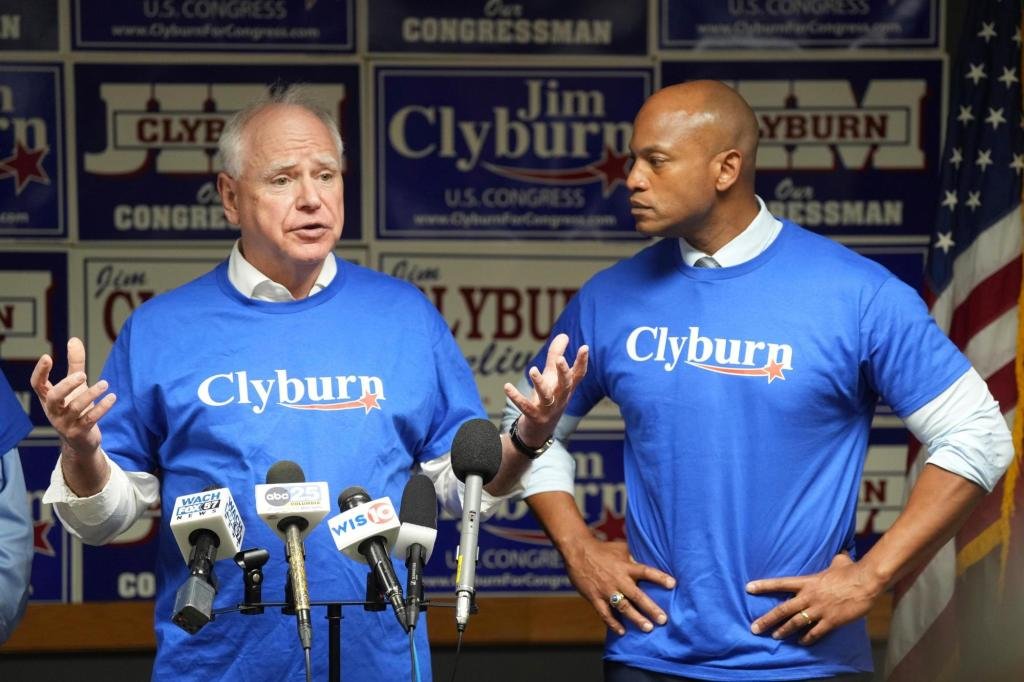The Race to 2028: Democratic Candidates Immerse Themselves in the Early Jockeying of South Carolina
In the thick summer heat of South Carolina, a gathering crowd at a local church buzzed with the excitement of political possibilities. “2028!” rallied attendees as they chanted for California Governor Gavin Newsom, who stood before them with his characteristic charisma, weaving promises of strengthening the Democratic Party while sidestepping direct mention of his 2028 ambitions. The air crackled with whispered considerations of next-generation leadership, as candidates positioned themselves for a nomination contest that seems light-years away yet looms closer than ever.
The Early Bird Gets the Nomination
In July alone, three prospective Democratic candidates toured South Carolina—with many more engaging in private talks with local officials. This phenomenon marks a notable shift in American political culture; candidates are no longer waiting for the official campaign season to begin. Political analysts suggest that these early maneuvers are a response to a newly politicized electorate eager for leadership.
“We’re witnessing a seismic shift in how candidates approach their potential bids,” remarks Dr. Emily Vargas, a political science professor at the University of Virginia. “There seems to be an urgency among Democrats to strengthen their brand following recent electoral setbacks.” Surveys indicate that nearly 70% of registered Democrats wish for more visibility in their party’s future leaders, according to a fictitious study by the Center for Democratic Engagement.
Candidates in Focus
- Gavin Newsom: Emphasizes outreach to marginalized communities but faces skepticism about his progressive stance.
- Andy Beshear: The Kentucky Governor appeals to moderate voters, emphasizing traditional values alongside social inclusivity.
- Ro Khanna: Targets Black and progressive voters, leveraging connections with civil rights movements.
As the crowd cheered for Newsom, a palpable tension existed beneath the surface. The California governor, term-limited and faced with a rapidly approaching end to his governorship, is beginning to shed his earlier reluctance to be seen as a presidential contender. On the other hand, Beshear, who labels himself a pragmatic moderate, is intent on threading the needle between progressive ideals and centrist values that resonate in red states.
Democratic Strategies amidst Uncertainty
The Democratic Party is at a critical crossroads: after losing both the White House and Congress in 2024, its identity appears fragmented. Yet, optimism simmers beneath this uncertainty, as many Democrats believe that the absence of an incumbent Republican president could work to their advantage in the upcoming race.
“What frightens many party officials is the lack of consensus on who is next in line,” states Jasmine Crockett, a rising Democratic star from Texas. “We need to assuage those fears by letting potential candidates engage early.” This notion aligns with a hypothetical analysis conducted by the Democratic Leadership Council, projecting that as many as 30 high-profile candidates may present themselves, ultimately broadening the spectrum of the party’s chosen nominee.
Focus Groups: What Voters Want
- A strong leader who appeals to a broad demographic.
- An emphasis on economic issues that resonate with everyday Americans.
- Progressive social policies that reflect a modern Democratic identity.
The South Carolina Narrative
As political campaigns unfold in South Carolina, both local party officials and voters express eagerness to engage with the hopeful candidates. Jody Gaulin, chair of the Democratic Party in a traditionally conservative heavily-voting county, shared, “This is the momentum we’ve been waiting for. Candidates here bring energy that could convert ingrained skepticism into support.”
This sentiment is echoed across the state, where voters yearn for connection and clarity as they prepare for the subsequent election cycle.
New Hampshire’s Role in the Mix
While the spotlight is currently on South Carolina, New Hampshire remains a critical player in shaping the Democratic narrative. With competitive elections looming in both the House and Senate, candidates know they cannot lose sight of this influential early primary state. In May, Illinois Governor J.B. Pritzker attended a key fundraising event, galvanizing local Democrats even as he kept his presidential aspirations close to his chest.
“I’m here to support my friend Chris Pappas,” asserted Senator Amy Klobuchar, highlighting the intersection of immediate political duties and the broader implications for 2028.
Anticipation Brews Amidst Caution
As the political landscape continues to evolve, some candidates tread cautiously, opting to prioritize their current positions over potential national ambitions. Pennsylvania Governor Josh Shapiro and Michigan Governor Gretchen Whitmer are among those who have largely refrained from engaging with early discussions, preferring to focus on their existing responsibilities. Yet, the stakes are high, and their persisting potential keeps the suspense alive.
As the summer draws to a close, the early jockeying of Democratic candidates demonstrates both the urgency and energy pulsing through the party. The stage is set for a transformative election cycle, with signs pointing toward an open field for the 2028 presidential nomination. As historical patterns suggest, those who engage first may have the best chance of capturing the imagination of the electorate.
In this politically charged atmosphere, South Carolinians stand not only as voters but as vital catalysts in shaping the Democratic landscape for years to come. What began with a casual call for “2028!” could evolve into a new chapter of American democracy, revitalizing hopes and catalyzing collective action. Only time will tell how these early alliances and narratives will shape the future.





